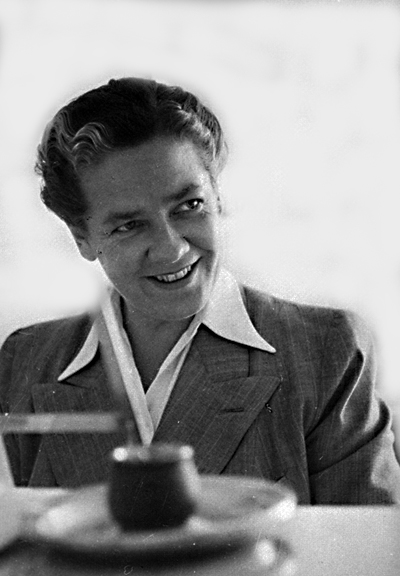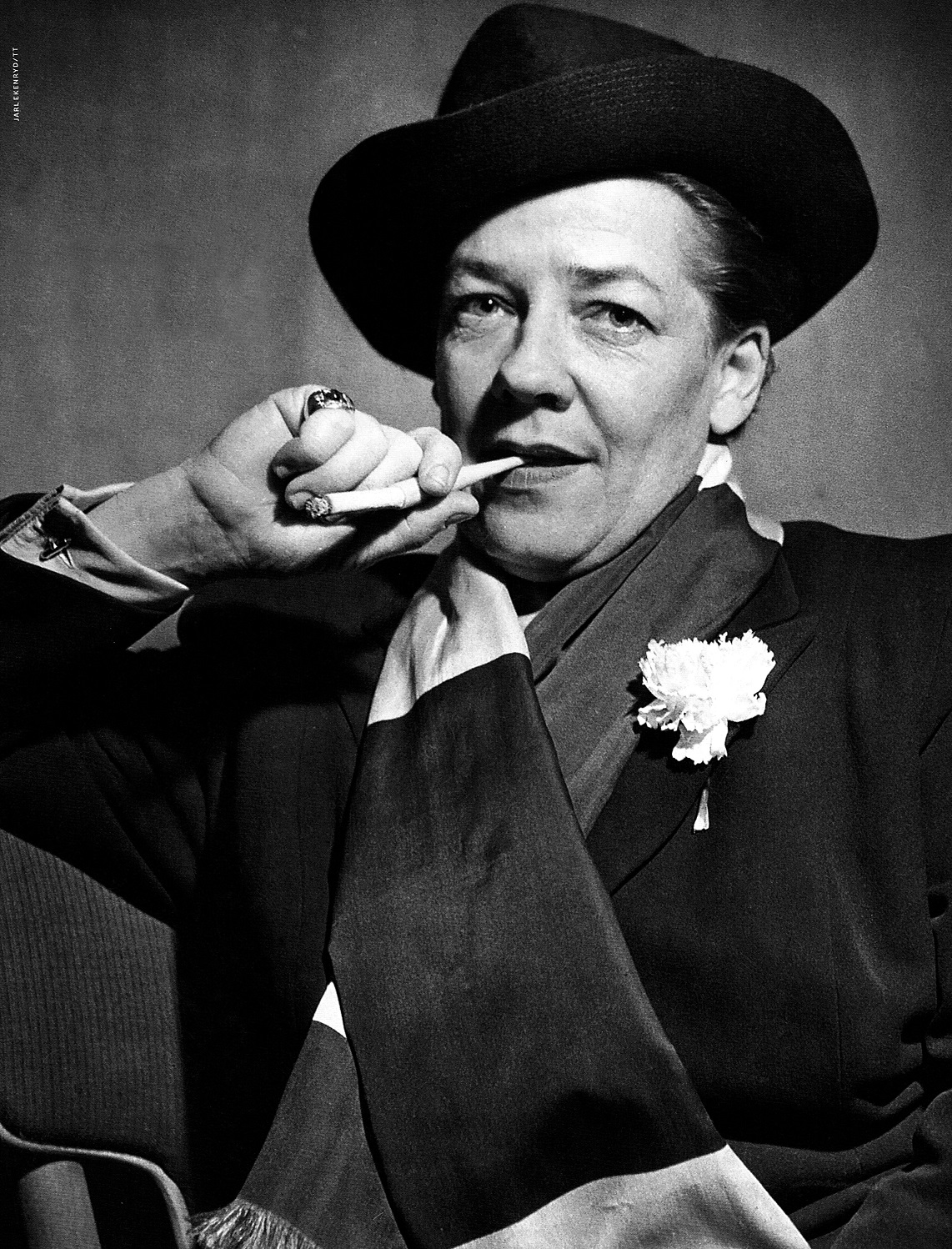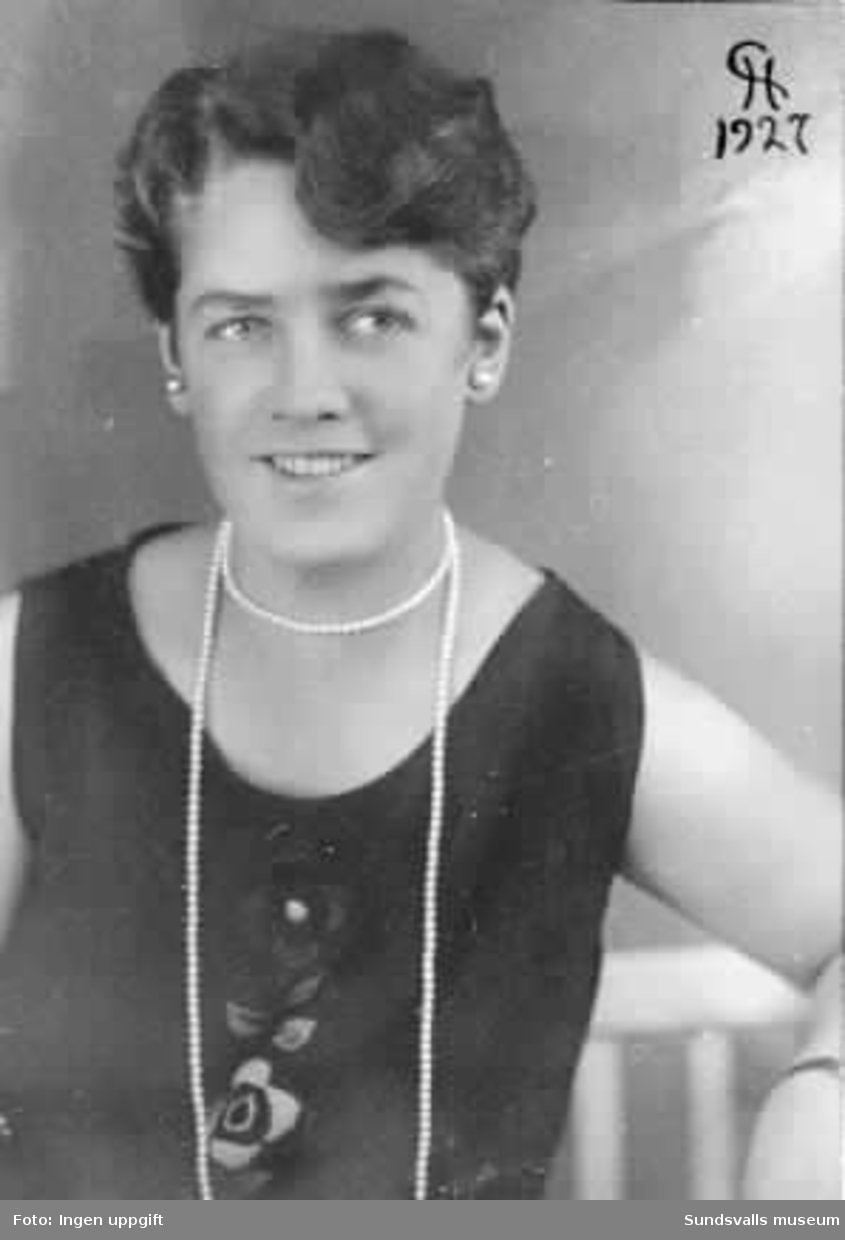The legacy of Gurli Bergström, or Kai Gullmar, her chosen pseudonym, contains a garland of Swedish evergreen songs, many of which can be heard in a long row of film comedies of the 1940s and 1950s. Gullmar wrote the title song from Swing it, magistern! (”Swing it, teacher!”, 1940, Schamyl Bauman), the film that launched the legendary jazz singer Alice Babs as well as bringing the swing music genre to a larger Swedish audience at the time. The soon-to-be major film director Hasse Ekman wrote the lyrics to the song.
Kai Gullmar became a popular composer of swing melodies, waltzes and sailor songs. Gullmar made her singing debut in an Ernst Rolf revue in 1929, but after being forbidden by her parents in engaging in this profession, she worked in the gramophone department of a piano store. Here, she sometimes enjoyed singing to English orchestral records, a kind of ”proto karaoke” that was heard in a loudspeaker on the street. Opera conductor Nils Grevillius happened to pass by and Gullmar was discovered, and soon she was able to start a gramophone artist career at the HMV record company. A little later, she was asked to provide the vocals on her own songs, and a new hit composer had been born.
In the early 1940s, Gullmar wrote melodies that were heard in popular films such as Melodin från Gamla stan (”Song of the Old Town”, 1939, Ragnar Frisk), Med dej i mina armar (”With you in my arms”, 1940, Hasse Ekman), Fröken Kyrkråtta (”Miss Church Mouse”, 1941, Schamyl Bauman) with the Danish comedienne Marguerite Viby – and, of course, the aforementioned Swing it, magistern! – a considerable hit. On most of her songs, Gus Morris (Gustaf Wahlenius) wrote the lyrics.
Many popular artists were successful with her songs, among them Sven-Olof Sandberg, Ulla Billquist, Karin Juel and Harry Brandelius. Some of her melodies were quite difficult to sing, not least the popular “Vart tar alla vackra flickor vägen” (“Where do all the beautiful girls go”), which Karl Gerhard nevertheless recorded with apt brilliance. Another example is “Bussvisan” (“The bus song”), sung by Inga Gill together with Ulla-Britt and Solveig Svensson in Sjunde himlen (”Seventh heaven”, 1956, Hasse Ekman), which ends with a wonderful, slow deceleration, accompanied by the words “He’s recovering from all those many hours of hustle and bustle…” (accompanied by a close-up of a seemingly distraught Gunnar Björnstrand, very likely in dire need of said recovery).
Kai Gullmar also wrote original music for films without any designated hit songs, such as the dramas Sonja (1943, Erik “Hampe” Faustman) and Sjätte skottet (“The Sixth Shot”, 1943, Hasse Ekman). She also appeared in small roles in a couple of Åsa-Nisse films and as the mother of the famous mischievous prankster Kalle in Anderssonskans Kalle (“Mrs. Andersson’s Kalle”, 1950, Rolf Husberg).
Mikaela Kindblom (2012, edited 2021)
(Translated by Jan Lumholdt)
Basic info
Main profession: Composer/Musician
Born: 1905
Died: 1982
Active: 1929-1961
Filmography
Kompositör originalmusik:
Familjen Andersson (1937)
Adolf klarar skivan (1938)
Adolf i eld och lågor (1939)
Melodin från Gamla stan (1939)
Med dej i mina armar (1940)
Magistrarna på sommarlov (1941)
Söderpojkar (1941)
Det går som en dans … (1943)
Kajan går till sjöss (1943)
Sjätte skottet (1943)
Sonja (1943)
Som folk är mest (1944)
Jubileumskatalogen berättar (1948)
Lilla Märta kommer tillbaka eller Grevinnans snedsteg eller Den vilda jakten efter det hemliga dokumentet (1948)
Soldat Bom (1948)
Skolka skolan (1949)
Anderssonskans Kalle (1950)
Den magiska cirkeln (1970)
Kompositör av låtar använda i filmer:
120 st i över 40 filmer,
bland annat Swing it, magistern! (1940)
Roll:
Den långa vägen (1947)
Lattjo med Boccaccio (1949)
Anderssonskans Kalle (1950)
Stjärnsmäll i Frukostklubben (1950)
91 Karlssons bravader (1951)
Spöke på semester (1951)
Enslingen Johannes (1957)
Åsa-Nisse bland grevar och baroner (1961)


